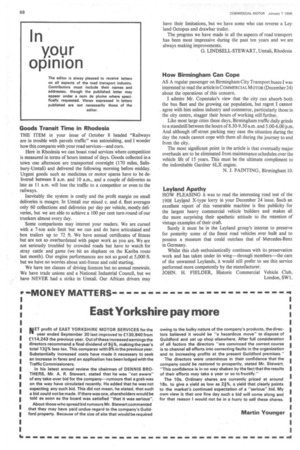In • your opinion
Page 70

If you've noticed an error in this article please click here to report it so we can fix it.
Goods Transit Time in Rhodesia
THE ITEM in your issue of October 8 headed "Railways are in trouble with parcels traffic" was astonishing, and I wonder how this compares with your road services—and ours.
Here in Rhodesia we can boast road services where competition is measured in terms of hours instead of days. Goods collected in a town one afternoon are transported overnight (170 miles, Salisbury-Umtali) and delivered the following morning before midday. Urgent goods such as medicines or motor spares have to be delivered between 8 a.m. and 10 a.m., and a couple of deliveries as late as 11 a.m. will lose the traffic to a competitor or even to the railways.
Inevitably the system is costly and the profit margin on small deliveries is meagre. In Umtali our mixed c. and d. fleet averages only 60 collections and deliveries per day per vehicle, mostly deliveries, but we are able to achieve a 100 per cent turn-round of our trunkers almost every day.
Some comparisons may interest your readers. We are cursed with a 7-ton axle limit but we can and do have articulated and box trailers up to 72 ft. We have annual certificates of fitness but are not so overburdened with paper work as you are. We are not seriously troubled by crowded roads but have to watch for stray cattle and game (we hit an elephant on the Kariba route last month). Our engine performances are not so good at 5,000 ft. but we have no worries about anti-freeze and cold starting.
We have ten classes of driving licences but no annual renewals. We have trade unions and a National Industrial Council, but we have NEVER had a strike in Umtali. Our African drivers may have their limitations, but we have some who can reverse a Leyland Octopus and drawbar trailer.
The progress we have made in all the aspects of road transport has been most impressive during the past ten years and we are always making improvements.
G. LINDSELL-STEWART, Umtali, Rhodesia
How Birmingham Can Cope
AS A regular passenger on Birmingham City Transport buses I was interested to read the article in COMMERCIAL MOTOR (D ecem be r 24) about the operations of this concern.
I admire Mr. Copestake's view that the city can absorb both the bus fleet and the growing car population, but regret I cannot agree with him unless industry and commerce, particularly those in the city centre, stagger their hours of working still further.
Like most large cities these days, Birmingham traffic daily grinds to a standstill between the hours of 8.30-9.30 a.m. and 5.00-6.00 p.m. And although off-street parking may ease the situation during the day the roads cannot cope with them all during the journey to and from the city.
The most significant point in the article is that eventually major overhauls are to be eliminated from maintenance schedules over the vehicle life of 15 years. This must be the ultimate compliment to the indomitable Gardner 6LX engine.
N. J. PAINTING, Birmingham 10.
Leyland Apathy
HOW PLEASING it was to read the interesting road test of the 1908 Leyland X-type lorry in your December 24 issue. Such an excellent report of this venerable machine is fine publicity for the largest heavy commercial vehicle builders and makes all the more surprising their apathetic attitude to the retention of vintage examples of their craft.
Surely it must be in the Leyland group's interest to preserve for posterity some of the finest road vehicles ever built and to possess a museum that could outclass that of Mercedes-Benz in Germany.
Whilst this club enthusiastically continues with its preservation work and has taken under its wing—through members—the care of the unwanted Leylands, it would still prefer to see this service performed more competently by the manufacturer.
JOHN. H. FIELDER, Historic Commercial Vehicle Club, London, SW1.




















































































































